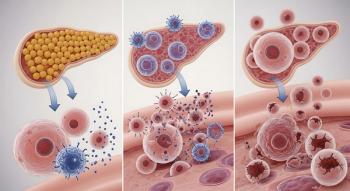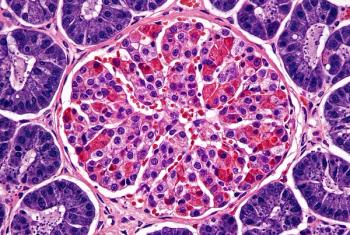
Patients Achieve Insulin Freedom with Tegoprubart Immunotherapy
Early research shows the CD40L antibody tegoprubart is able to reduce insulin dependence in patients with type 1 diabetes after islet transplants.
Eledon Pharmaceuticals has announced positive initial data from an investigator-initiated trial at the University of Chicago Medicine's Transplantation Institute evaluating tegoprubart, Eledon’s anti-CD40L antibody, as part of an immunosuppression regimen for islet transplantation in patients with type 1 diabetes.
Type 1 diabetes is an autoimmune disease that affects about 2 million Americans, about 5% to 10% of all diabetes cases, according to the Centers for Disease Control and Prevention (CDC).
Pancreatic islet transplantation can provide blood glucose control for patients with type 1 diabetes. Islets containing insulin-producing beta cells are isolated from the pancreas of a deceased organ donor. After transplant, patients receive immunosuppression therapy to prevent transplant rejection. The
Tegoprubart is an investigation drug being studied as an immunosuppressant. It has been shown to block CD40L and inhibit multiple key components of how immune cells communicate with one another to suppress immune response.
In the University of Chicago study, two out of three patients treated with tegoprubart achieved insulin independence and normal blood glucose control. A third patient was recently transplanted and on a trajectory for insulin independence. Islet engraftment in the first two patients was estimated to be three to five times higher than in three comparable patients receiving the current standard of care tacrolimus-based immunosuppression. This suggests tegoprubart may be less toxic to the transplanted islets, resulting in improved graft survival and function.
Patients in the study received islet transplants combined with induction therapy, mycophenolate mofetil, and tegoprubart, given every third week by intravenous infusion. The first two patients achieved insulin independence approximately 2 months to 6 months after their islet transplants, maintaining normal HbA1c levels. The third patient reduced insulin use by more than 60% within the first few days post-transplant.
The treatment with tegoprubart was generally well-tolerated, with no unexpected adverse events or severe hypoglycemic episodes reported.
These results further demonstrate tegoprubart's potential as a novel immunosuppression option that could play a central role in advancing islet transplantation as a transformational therapy for individuals with type 1 diabetes. The data were presented at the International Pancreas and Islet Transplantation Association (IPITA), Harvard Stem Cell Institute (HSCI), and Breakthrough T1D Summit on Stem Cell Derived Islets, Oct. 29, 2024.
One of the investigators at University Chicago Medicine also highlighted the significance of these data, stating they represent an important step toward achieving functional cures for type 1 diabetes through improved immunosuppression approaches that minimize side effects.
“For more than 30 years, we have been looking for options that can deliver target levels of immunosuppression without the side effects associated with standard of care, including toxicity to the kidneys, central nervous system and islet cells, and increased risk of diabetes and hypertension,” said Piotr Witkowski, M.D., Ph.D., director, Pancreas and Islet Transplant Program, said in a
Funding for the study includes grants from Breakthrough T1D (formerly known as JDRF) and The Cure Alliance.
Tegoprubart is also being studied in a phase 2 trial sponsored by Eledon Pharmaceuticals to prevent organ rejection in patients undergoing kidney transplantation. This trial has enrolled 120 patients to compare tegoprubart with tacrolimus.
Newsletter
Get the latest industry news, event updates, and more from Managed healthcare Executive.























